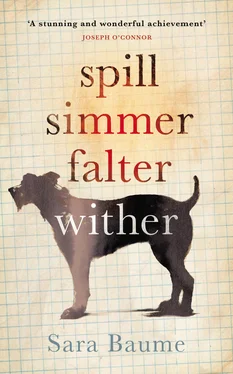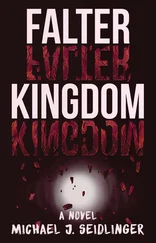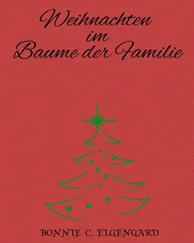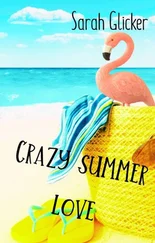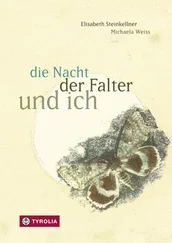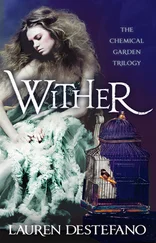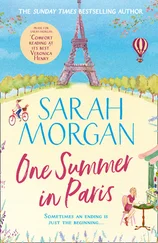Early in life I learned to look after myself as well as Aunt. I’d see how she was trying to do something: open a can, butter a slice of toast, reach the shelf where the biscuit tin sat, then I’d do it for her. ‘GOOD BOY!’ she’d shout, and a little more quietly but never quietly enough, ‘poor fool’, she’d mutter, ‘poor little fool.’
What was her name? I can’t remember. She looked like a peasant farmer’s wife from the nineteenth century, her breast bound in shawls with a puckered face in a gap at the top and the wrinkles in her skin eddying into the folds of her headscarf. It was Aunt who was responsible for the only other poster that hung upon my bedroom wall. It was headed ‘Emergency First Aid for Children’ and I suspect she intended it more for her own benefit than mine. Beneath the header there was a sequence of panels and each panel depicted a different scenario in which an adult person was in some way struggling for their life and a child person was doing their calm and measured best to rescue them, and now I remember how the persons from the poster used to abscond from their place on the wall at night and insinuate themselves into my dreams.
In the end, Aunt didn’t die on my watch. I didn’t even know she had and that I’d missed my opportunity to put any of the panels into practice until my father took me to the removal. The funeral home was full of people, there must have been an emissary from every household in the parish, but none of them looked particularly upset, nobody sighed or gulped or sobbed. Back again in my father’s house he asked me if I thought I was old enough now to take care of myself. I was nine. I could read fast as a firecracker. I knew First Aid inside out because every night I dreamed up a new emergency. I banked on this being all there was to know. Yes, I said. And in this way, the years passed and passed and passed, just the old man and me and then just me and then you, and now us.

Today, we are planting. I know it’s already too late in the season. My father’s shelf full of gardening manuals would shake their spines in reproach. But every year I plant according to my own unwritten and annually misremembered set of rules, and every year I accept the bounty however scant or sickly. I pick the slugs off and blast the greenfly down the plughole. Too light to sink, they walk on water like tiny green Jesuses.
On Tuesday, I go out alone and into town. The post office followed by the supermarket, and here I buy saplings and seedlings from the gardening section. Fruit, vegetables and herbs; I’ve never bothered with flowers. I’ve always thought it would seem like an insult to the wild ones which every summer arrive unbidden in my yard. Up from the lightless cold they thrust their heads through the compacted dirt and burst into petals amongst the gravel. As though, like the swallows, they’ve chosen me.
Today it’s raining in the yard and on the sea front and all across the bay, and so we’re gardening in the kitchen, right here atop the unclothed table at which my father died. Whereas then it was tidily laid for breakfast, now my packets and utensils are lost amidst the queeny frill ashtrays, marmalade jars packed with inkless biros and a whole squad of other stuff I never get around to throwing out. There’s half a dozen pea plants for transferring into a grow-bag, now a few trays of tomato saplings and a titsy raspberry bush to go into pots. The pots will allow their suckling tentacles to proliferate, and then they’ll stretch and fruit. You sit between the table legs as I work. You examine the trickles of compost. They hit the lino and scarper free in all directions. Under the fridge, the washing machine, the oven. What do you think my compost smells like? Like the kind of soil a man in a factory made, like moistened rootlings and flittered bark but with an aftertaste of chemicals?
I drag the grow-bag through the rain to the stone fence and clear a spot amongst the buoys and bits of buoy which should seize some sun, if ever the sun comes. The raspberry bush can go here too but the tomatoes stay where it’s snug on the kitchen windowsill. I clear the tabletop back to its original mess and roll a cigarette which tastes as though there are tiny pieces of compost entwined with the tobacco. Now I lean against the door frame with coffee cup in hand and you sitting on my shoes. Together we regard the backyard’s newest arrivals. Soon the pea shoots will be twice as long and their curly tendrils will be grappling for something to cling to. Then we’ll go to the forest and gather broken branches and I’ll push them into the grow-bag for the shoots to hoist themselves up and clasp the mini trees tight to their stalky breasts. The pea shoots need the pea sticks like the ivy needs a trellis, like the tickbird needs a rhino, like I need gingernuts and cigarettes and you at my feet, sitting to attention, sniffing the breeze.
You shift your weight to lean against my shin. You’re dry and warm and soft yet solid. I feel the bulge and fall of your ribcage as you sigh. You seem to do a lot of sighing. I find it strange because I always thought of a sigh as an expression of the sort of feeling which animals are not supposed to be capable of, and I wonder do you sigh because you have the smog inside you, my sapping smog. Does it build within your chest until your muscles spasm and push it out, away?
I don’t expect the rain will let up long enough for the plants to need watering. Standing beneath the door lintel regarding our sorry garden, a swallow swoops low, hesitates, flies on. And I wonder was it one of mine. I wonder are my swallows back.

Once my father was gone, I expected that someone would come for me. I expected them to lock me up somewhere I wouldn’t be able to impede the busy-bodies, the regular people. I expected to be institutionalised. I mistook the shrieking gulls for sirens and locked myself inside the bathroom to hide from flashing lights. But nobody came.
I summoned every last dot of valour I could scratch from my soul, I swallowed a shot glass of rescue remedy and went to the social welfare office. I filled out forms and ticked boxes. I found that continued survival came down to a simple matter of form-filling, a basic proficiency in the ticking of boxes. And because I managed never to miss a box or make an illiterate mark on the bottommost line instead of signing my name, nobody came.
And here I am still, and here you are.

We turn the page of the calendar, from the donkeys to a row of deckchairs in a leafy park with an opalescent pond, a commemorative bench, its inscription too small to read, and a solitary moorhen.
It’s two weeks since the clamping of the collie on Tawny Bay. Two weeks of sheltering in my father’s house. I can tell you’re growing listless. I’m listless too. If it was winter, I could accept the murky weather, the incarcerating walls. But with summer comes hope, and with hope comes disappointment. Now dawn is the only time we can safely walk, and every dawn breaks pale and ungleaming, and every stretch between dawns is ruthlessly long. I want to go out during the day but I’m afraid. I’m afraid of meeting HENRY HENRY HENRY and Henry’s woman again, of being screeched at and flogged in the street with a golf umbrella. I’m afraid of being stopped and asked for my name and our address, of being shown the bite marks in Henry’s princely face and the way in which the distance between them matches the exact distance separating your two pointiest teeth. I’m afraid, I think more than anything, of losing you.
Читать дальше
